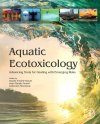![Aquatic Ecotoxicology Aquatic Ecotoxicology]()
Click to have a closer look
About this book
Contents
Customer reviews
Biography
Related titles
About this book
Aquatic Ecotoxicology: Advancing Tools for Dealing with Emerging Risks presents a thorough look at recent advances in aquatic ecotoxicology and their application in assessing the risk of well-known and emerging environmental contaminants.
This essential reference, brought together by leading experts in the field, guides users through existing and novel approaches to environmental risk assessment, then presenting recent advances in the field of ecotoxicology, including omics-based technologies, biomarkers, and reference species.
Aquatic Ecotoxicology: Advancing Tools for Dealing with Emerging Risks then demonstrates how these advances can be used to design and perform assays to discover the toxicological endpoints of emerging risks within the aquatic environment, such as nanomaterials, personal care products, PFOS and chemical mixtures. The text is an invaluable reference for any scientist who studies the effects of contaminants on organisms that live within aquatic environments.
Contents
- Introduction
- Conventional Risk Assessment
- Retrospective Assessment and Environmental Monitoring
- How to Improve Exposure Assessment
- From Incorporation to Toxicity
- From Microcosms to Mesocosms and Field
- Individual Biomarkers
- Omics
- Reference Species
- Endobenthic Invertebrates as Reference Species
- Filter-feeding Bivalves as Reference Species in the Water Column
- Gammarids as Reference Species in Freshwater
- Copepods as Reference Species in Estuarine and Marine Waters
- Fish as Reference Species in Different Water Masses
- Biological Responses at Supra-individual Levels
- Ecotoxicological Risk of Endocrine Disruptors
- Ecotoxicological Risk of Personal Care Products and Pharmaceuticals
- Ecotoxicological Risk of Nanomaterials
- Ecotoxicological Risk of Mixtures
- General Conclusions
Customer Reviews
Biography
Catherine Mouneyrac is a professor in marine ecotoxicology at the Université Catholique de l'Ouest (France). She teaches graduate and undergraduate courses in animal physiology, aquatic ecology and ecotoxicology. She gained her PhD from the University of Lyon I (France) in physiology of fish nutrition, and then a DSc in aquatic ecotoxicology from the University of Nantes (France). She is the dean of the Faculty of Sciences at the Universit Catholique de l'Ouest and the head of the emerging contaminants research team of the MMS (Sea, Molecules, Health) unit (LUNAM University). Her general field research concerns the response of aquatic organisms to natural and chemical stress. She is actively involved in research to elucidate the mechanisms involved in potential toxicity by nanomaterials and endocrine disruptors towards estuarine and marine organisms. At the interface of fundamental and applied research, she aims to fulfill the gap between ecological (bio indicators) and ecotoxicological (biomarkers) approaches, the final objective being to help environmental diagnosis. More precisely, she studies biomarker tools allowing extrapolating from suborganismal responses (biochemical biomarkers, energy reserves, reproduction processes) and organismal (biological indices, behavioural biomarkers) to effects occurring at higher levels of biological organization (population). C. Mouneyrac has participated to the conception and realization of numerous national, European and international programmes. She has published more than 75 peer-reviewed papers and book chapters in the field of aquatic ecotoxicology. She is referee for numerous international journals on environmental pollution. She is member of different research networks in environmental pollution assessment. Dr C. Mouneyrac is part of the Expert committee on the assessment of the risks related to physical agents, new technologies and development areas and member of the working group "Assessment of the risks associated with nanomaterials at the French Agency for Food, Environmental and Occupational Health & Safety (Anses). She has been selected as a senior decision-makers a to follow the national study course of the Institut des Hautes Études pour la Science et la Technologie whose supervision is the responsibility of the Ministries of Higher Education and Research and Education in France.



































